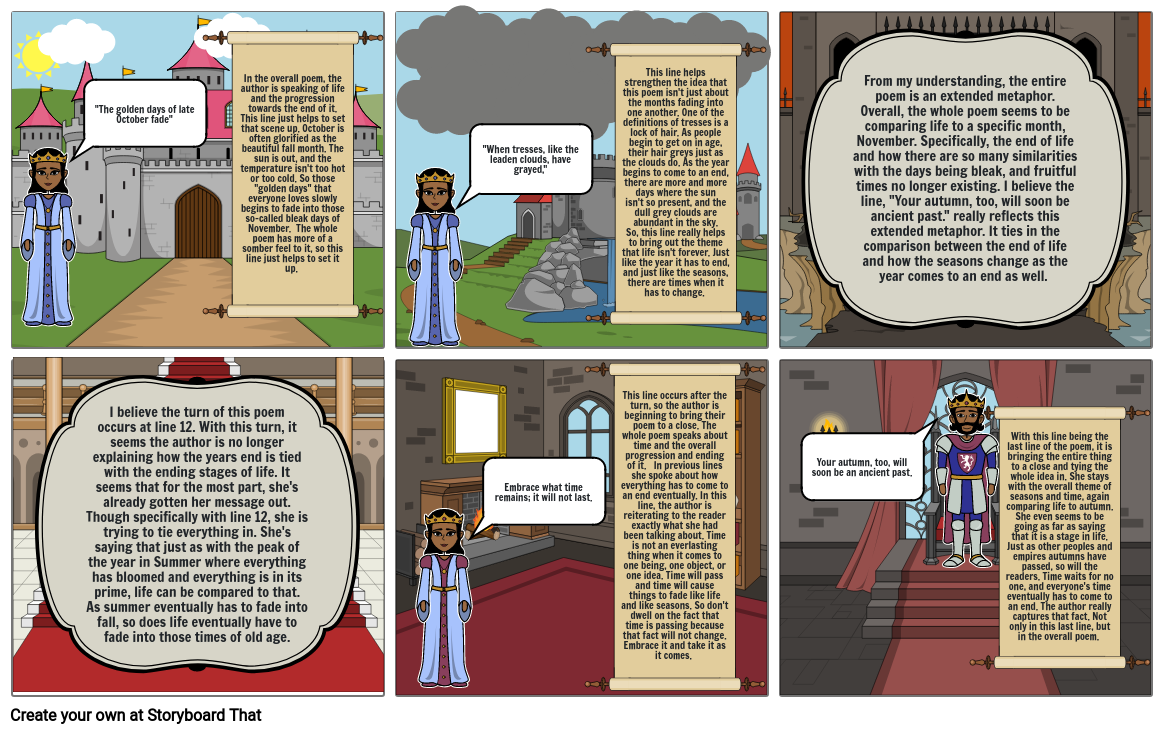Unknown Story

טקסט Storyboard
- "The golden days of late October fade"
- In the overall poem, the author is speaking of life and the progression towards the end of it. This line just helps to set that scene up. October is often glorified as the beautiful fall month. The sun is out, and the temperature isn't too hot or too cold. So those "golden days" that everyone loves slowly begins to fade into those so-called bleak days of November. The whole poem has more of a somber feel to it, so this line just helps to set it up.
- "When tresses, like the leaden clouds, have grayed,"
- This line helps strengthen the idea that this poem isn't just about the months fading into one another. One of the definitions of tresses is a lock of hair. As people begin to get on in age, their hair greys just as the clouds do. As the year begins to come to an end, there are more and more days where the sun isn't so present, and the dull grey clouds are abundant in the sky. So, this line really helps to bring out the theme that life isn't forever. Just like the year it has to end, and just like the seasons, there are times when it has to change.
- From my understanding, the entire poem is an extended metaphor. Overall, the whole poem seems to be comparing life to a specific month, November. Specifically, the end of life and how there are so many similarities with the days being bleak, and fruitful times no longer existing. I believe the line, "Your autumn, too, will soon be ancient past." really reflects this extended metaphor. It ties in the comparison between the end of life and how the seasons change as the year comes to an end as well.
- I believe the turn of this poem occurs at line 12. With this turn, it seems the author is no longer explaining how the years end is tied with the ending stages of life. It seems that for the most part, she's already gotten her message out. Though specifically with line 12, she is trying to tie everything in. She's saying that just as with the peak of the year in Summer where everything has bloomed and everything is in its prime, life can be compared to that. As summer eventually has to fade into fall, so does life eventually have to fade into those times of old age.
- Embrace what time remains; it will not last.
- This line occurs after the turn, so the author is beginning to bring their poem to a close. The whole poem speaks about time and the overall progression and ending of it. In previous lines she spoke about how everything has to come to an end eventually. In this line, the author is reiterating to the reader exactly what she had been talking about. Time is not an everlasting thing when it comes to one being, one object, or one idea. Time will pass and time will cause things to fade like life and like seasons. So don't dwell on the fact that time is passing because that fact will not change. Embrace it and take it as it comes.
- Your autumn, too, will soon be an ancient past.
- With this line being the last line of the poem, it is bringing the entire thing to a close and tying the whole idea in. She stays with the overall theme of seasons and time, again comparing life to autumn. She even seems to be going as far as saying that it is a stage in life. Just as other peoples and empires autumns have passed, so will the readers. Time waits for no one, and everyone's time eventually has to come to an end. The author really captures that fact. Not only in this last line, but in the overall poem.
נוצרו מעל 30 מיליון לוחות סיפור

